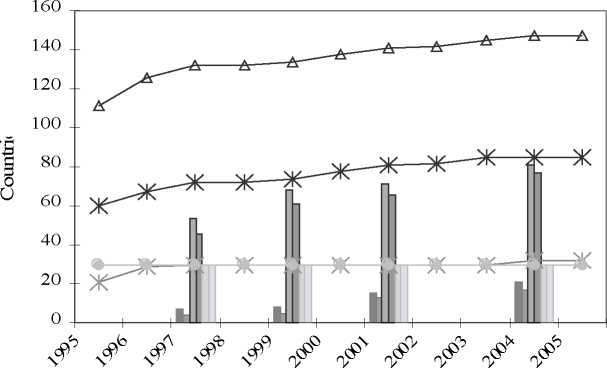the principle of justification and 2) the principle of transparency. The principle of
scientific justification implies that SPS measures which are stricter than the international
guidelines have to be based on scientific justifications. The principle of transparency
obligates that trading partners have to be notified of all changes in SPS measures which
could affect trade either in a positive or in a negative manner. Countries have to
establish national Enquiry Points, where trading partners have the possibility to receive
information concerning all food safety regulations of the country and national
notification authorities which are in force to implement all notification procedures
required in the SPS Agreement. Figure 1 depicts the number of WTO members among
LDCs, DCs and OECD countries (shown as lines). The bars depict the number of those
countries which notified either an Enquiry Point (EQP) or/and a Notification Authority
(NNA).
Figure 1. Compliance of WTO Members with Transparency Requirements

LLDCs with EQP
I I LDCs with NNA
I I Non-OECD Non-LDC
with EQP
I I Non-OECD Non-LDC
with NNA
I I OECD Countries with
NNA
I I OECD Countries with
EQP
N Non OECD-Non-LDC
LDC Members
OECD Members
T T otal members of WT O
Source: Own illustration, [23, 24, 25, 27, 29, 30]
As can be seen in Figure 1, all OECD countries reported an Enquiry Point and a
Notification Authority by 1997. In contrast, it took a much longer time period for many
developing countries especially for the LDC countries to comply with the transparency
requirements of the SPS Agreement. In 2001, 25 out of 140 members, including 15 LDCs
had not jet registered an Enquiry Point and 32, including 17 LDCs had not registered a
Notification Authority. In 2004, only 4 developing countries had not registered an
Enquiry Point but still 11 LDCs had not jet fulfilled the requirement. Still, 23 developing
countries had not registered a Notification Authority including 15 LDCs. In May 2005
139 out of 148 members (94%) had notified their Enquiry Point and 130 (87%) had
identified their national Notification Authority [30]. Even though developing countries had
a longer time span to implement the requirements of the agreement one other reason
for the time lag of developing countries in fulfilling the SPS Agreement however might
be found in their rare participation in the SPS Committees meetings. Until 2001 43
developing countries did not attend to any of the official meetings [13].
The SPS Agreement pays attention to the specific situation of developing countries in
particular with respect to its implementation periods and in the obligation of developed
countries to provide technical assistance to developing countries. The SPS Secretariat
circulated two questionnaires among developing countries in the years 1999 and 2001
regarding the needs of developing countries for technical assistance. In September 2002
the Standards and Trade Development Facility was established 4 to coordinate the efficient
use of resources in SPS related activities and thus enhance developing countries’ SPS
capacity.
There has already been five years experience with the SPS Agreement when the Doha
round started in 2001 in Qatar. The new negotiations had been supposed to take
especially developing countries’ needs into account. Even though SPS measures had such
a high relevance for international agricultural trade and developing countries in
particular had large concerns about these measures affecting their trade competitiveness
International Plant Protection Convention (on plant health).
4 The STDF was established by the Food and Agriculture Organization (FAO), the World
Organization for Animal Health (OIE), the World Bank, the World Health Organization (WHO) and
the World Trade Organization (WTO).
More intriguing information
1. On Dictatorship, Economic Development and Stability2. The name is absent
3. Discourse Patterns in First Language Use at Hcme and Second Language Learning at School: an Ethnographic Approach
4. DEVELOPING COLLABORATION IN RURAL POLICY: LESSONS FROM A STATE RURAL DEVELOPMENT COUNCIL
5. Banking Supervision in Integrated Financial Markets: Implications for the EU
6. Perceived Market Risks and Strategic Risk Management of Food Manufactures: Empirical Results from the German Brewing Industry
7. The name is absent
8. The name is absent
9. The name is absent
10. Conditions for learning: partnerships for engaging secondary pupils with contemporary art.